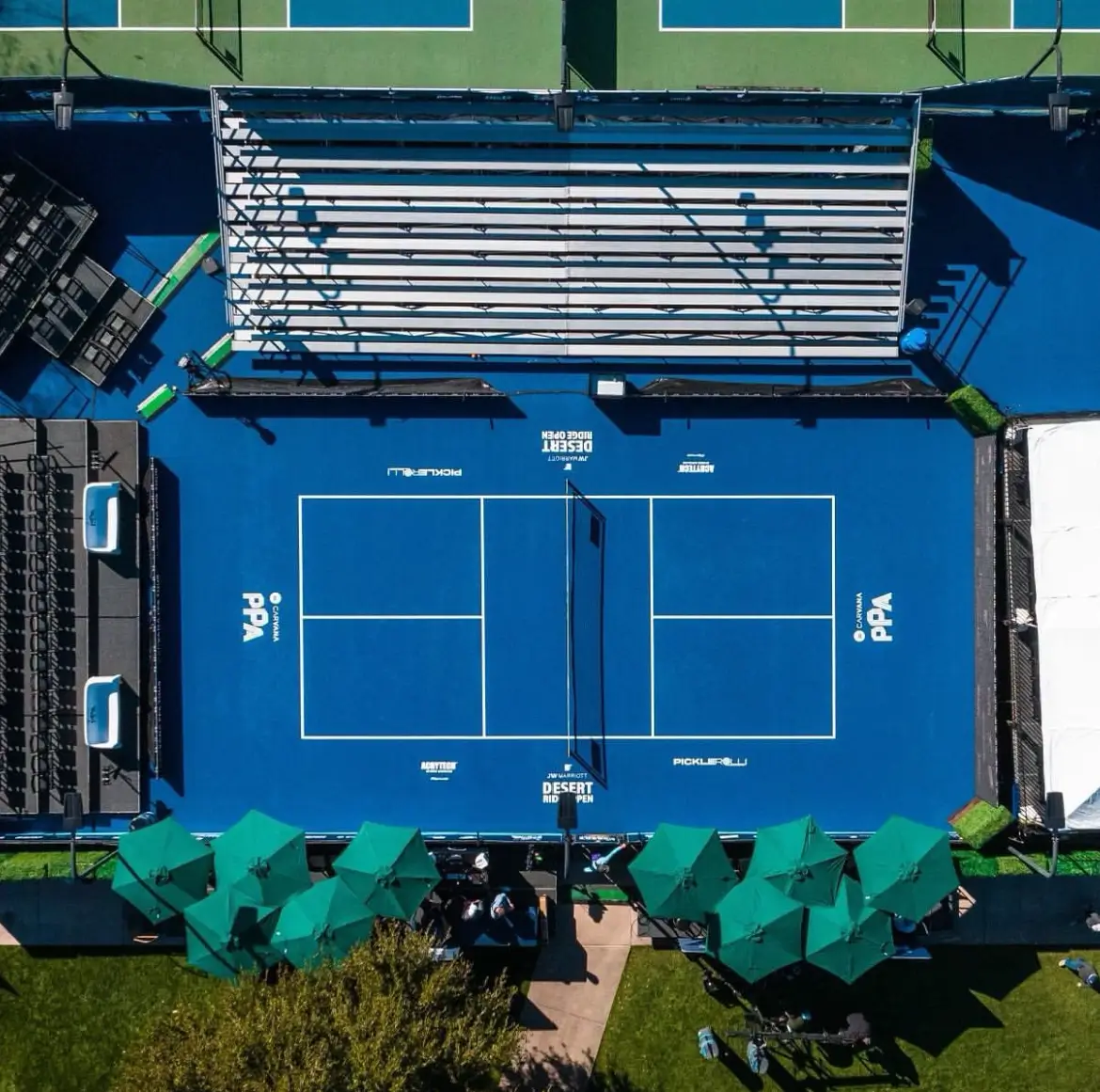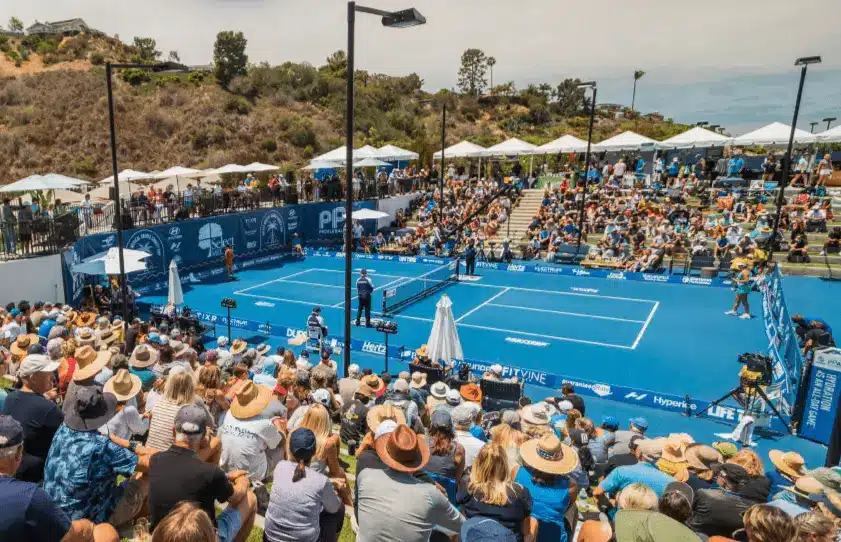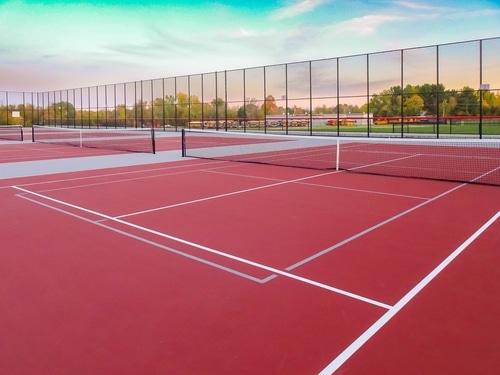Pickleball vs. Badminton
| May 7, 2024
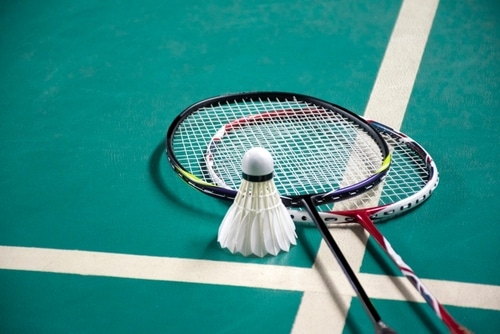
Pickleball and badminton are both racket sports, but there are several differences when it comes to court size, game play, equipment and more.
Check out some of the similarities and differences here:
Layout and court size
Pickleball and doubles badminton are the same size court – 44-feet long by 20-feet wide. There’s a non-volley zone for pickleball seven feet from the net on both sides of the court. The net in pickleball is 36-inches high on the ends and 34-inches high across the middle section of the net.
Badminton’s net is 5-feet high in the center and 5-feet, 1-inch high on the ends. The badminton court layout also includes boundary lines for singles play with specific service courts for serving and receiving.

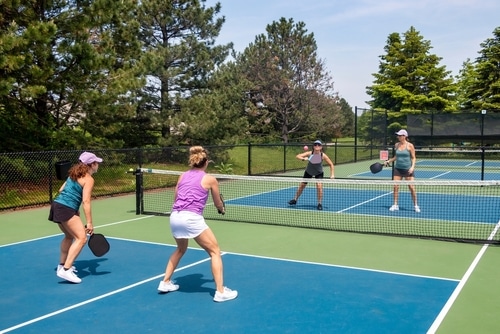
Equipment
Badminton is played with lightweight rackets, made of graphite or carbon fiber. Instead of a ball, like tennis or other racket sports, badminton uses a shuttlecock or “birdie.” It is a feathered projectile made of cork and feathers and is extremely lightweight.
Pickleball is played with paddles made of wood, composite materials like graphite, or carbon fiber. The ball is similar to a wiffle ball, but is a bit heavier. It has holes in it, as is usually made out of a composite plastic. There are both “indoor” and “outdoor” balls.
Gameplay
Badminton features fast-paced rallies, requires excellent reflexes and agility. The shuttlecock’s flight characteristics make for unpredictable game play, which is so much harder to gauge than a round ball. It’s extremely fast-moving and requires a lot of jumping and excellent cardiovascular conditioning.
Pickleball is known for its strategy, engaging in short shots near the non-volley zone, favoring placement over power.
Both sports are known for doubles play, leading to more of a social environment and the need for more teamwork.
Scoring
Badminton games are typically played to 21 points, with a player or team needing to win by at least two points. Matches are usually formatted in a best two-of-three.
Pickleball games are generally played to 11 and a team must win by at least two points. Similarly to badminton, matches are usually a best two-of-three style.
(View our pickleball scoring guide to learn more on how to score in pickleball)
Serving
In badminton the serve must be made from within the server’s service court. The motion is underhand, with the birdie held in an open palm. The server must hit the birdie below waist level and strike it in an upward trajectory.
The server serves from the right service court if the team’s score is even and from the left service court if the score is odd. In doubles play, the server puts the birdie in play from the right service court to the opponent in the opposite right service court, and vice versa for the left service court.
After each point, the server alternates sides with the server switching between right and left courts. If the serving side wins a rally, the server continues to serve from the same service court. If the receiving side wins a rally, the receiving side becomes the serving side.
If the birdie touches the net during the serve, but still lands in the proper service court, it’s a “let,” and the serve is retaken without a penalty. If the server commits a fault during the serve, the receiving side gets a point.
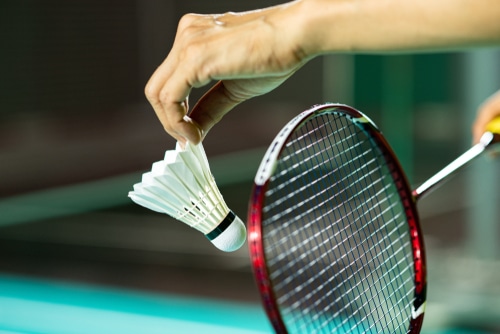
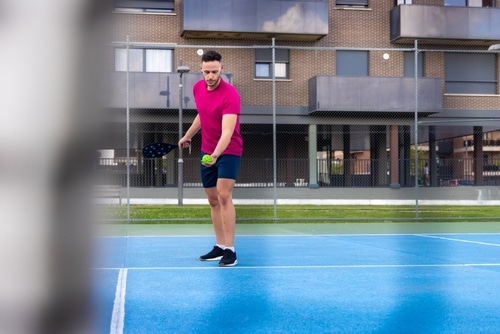
In pickleball, the underhand serve is pretty much the standard, at least at the pro level. Serves must be diagonal, cross-court, with both feet behind the baseline. The serve must be in an upward motion with the impact coming below the waist. Serves also have to land beyond the non-volley zone or it is a fault. Each server in pickleball gets one attempt.
If the serving team earns a point, the server will switch sides with his or her partner and serve to the opposite side. This continues until the receiving team wins a rally.
How hard is it to play?
Badminton is somewhat more challenging to play than pickleball at the amateur level, a lot of it because of the unpredictability of the birdie, which tends to float and sink at odd angles. That means excellent hand-eye coordination is a must. Badminton involves mastery of a variety of shots and learning the technique for each takes a lot of time and practice.
By most accounts, people seem to have a fairly easy time beginning to learn to play pickleball. The rules are simple, the smaller court and slower ball speed make it somewhat simple, as well as making it a low barrier for entry, unlike tennis. Pickleball is described as a mix between a number of racquet sports, making it fairly accessible to people of all ages and different athletic abilities.
How physically fit do you need to be ?
Pickleball still demands good footwork, excellent eye-hand coordination and quick reflexes, but because the court is shorter, the ball a bit slower, the demands on the body are definitely less than padel, tennis or squash.
It’s not tennis, but badminton can be physically demanding, because of the continuous movement needed. It’s fast-paced, requiring players to cover the entire court area, including moving forward and backward as well as constantly reaching for the birdie. Also, because the birdie is reachable by most shots, many rallies last a long time and can wear a person out if they are not in decent physical shape.
Both sports ask a lot out of the player, because of movement, agility, footwork and flexibility.
How popular is the sport?
Pickleball might be gaining in popularity, and it is the fastest-growing sport in the United States, but badminton is one of the most-popular sports in the world. Badminton has huge participation numbers, played by millions all over the world, particularly in Asia and Europe. Countries like China, Indonesia, Malaysia and India have a number of the top players in the world.
Pickleball courts are more plentiful today than they were a year ago and certainly more than 10 years ago. There are numerous places to play for any skill level player. In addition, there are multiple professional tours, which means more people are watching the sport today than ever before.
Pickleball also has all the social benefits of players being close together, teamwork and ease of learning that make the sport increasingly popular to try out.


